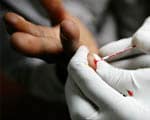Standard HIV tests can't identify people very recently infected with the virus, but a more sensitive test can, new research shows.

By testing for HIV's genetic material in addition to antibodies against the virus in more than 3,000 people, researchers at the University of California, San Diego identified 15 HIV-infected patients who the standard test would have missed.
In the first few days after becoming infected with HIV a person has extremely high amounts of the virus in the blood, meaning he or she can transmit the virus to others much more readily. Blood banks screen donors for HIV with nucleic acid testing, or checking for the building blocks of the virus's genetic material; this approach can identify an HIV-positive person about 12 days before that person begins making antibodies against the virus. Standard rapid tests now in use for HIV screening look for these antibodies. While these tests can produce results in a half-hour, they will miss very early infections.
In the new study, researchers looked at whether the genetic material test could identify more newly infected individuals than the current standard rapid tests. They tested 3,151 people seeking HIV testing at sites in San Diego County using both the nucleic acid test and the rapid test.
Seventy-nine people had HIV infection, 15 of whom had tested positive with the nucleic acid test but were negative with the rapid test. The researchers also offered study participants the opportunity to check their results by voice mail or on the Web. Those who tested positive with the rapid test were told on-site, while those who tested negative were told that if the more sensitive test identified HIV infection - the test takes a few days to produce results - they would be contacted within two weeks. The participants who did not hear from clinic staff by then could call a voicemail number or log on to a confidential website to get their results. Sixty-nine percent of the study participants who tested negative accessed their results through voice mail or the Internet, with about two-thirds of these individuals opting for the Internet.
The researchers concluded that nucleic acid testing programs that include automated systems for result reporting can increase case yield in patients being tested for HIV.
DoctorNDTV is the one stop site for all your health needs providing the most credible health information, health news and tips with expert advice on healthy living, diet plans, informative videos etc. You can get the most relevant and accurate info you need about health problems like diabetes, cancer, pregnancy, HIV and AIDS, weight loss and many other lifestyle diseases. We have a panel of over 350 experts who help us develop content by giving their valuable inputs and bringing to us the latest in the world of healthcare.













